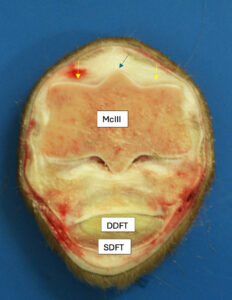
Fibrillar Pattern Ultrasound Findings in Young Thoroughbreds
Researchers have defined the significance of suspensory ligament abnormalities and their impact on racehorse performance.


Researchers have defined the significance of suspensory ligament abnormalities and their impact on racehorse performance.

Recent research offers fresh insights on post-ovulation breeding timing, risks of broodmare obesity, and twin reduction outcomes.

Use SMART supplementation strategies and the ACCLAIM system to find a quality product.

Scientists are studying the safety, efficacy, mechanisms of action, and pharmacokinetics of equine nutritional supplements.

A comprehensive look at options for keeping equine athletes with arthritis on the move. Sponsored by Bimeda.

Experts share best practices for feeding and managing aging metabolic horses in The Horse‘s Older Horse 2025 issue.

During the 2024 AAEP Kester News Hour experts shared new research on equine genetics, atrial fibrillation detection, neck pain, and updated EHV guidelines.

Researchers described the most common abnormalities seen on imaging in nonlame show jumpers—problems that could lead to lameness in the horses’ future.

Selective treatment strategies can combat antimicrobial resistance while protecting foals from R. equi. Read more in The Horse‘s Spring 2025 issue.

Laminitis in horses involves multiple pain pathways. Here’s how veterinarians can effectively address them using targeted treatment strategies.

Changing antibiotic prescribing habits can be challenging for practitioners, but small steps, peer support, and stewardship guidelines can improve antimicrobial use.

Learn why experts are questioning routine antibiotic use in equine orthopedic surgery and how alternative strategies can help reduce infection risk.

Reserve antibiotics in equine reproduction for proven infections, not routine use. Vets should utilize alternative treatments to reduce AMR risk when possible.

To reduce antibiotic use in equine practice, vets should limit prophylactic treatment and prescribe only for confirmed infections.

One expert calls antimicrobial resistance a threat to global horse health. Here’s how equine vets can improve diagnostics and use antibiotics wisely to combat this crisis.

Find out which horses and ponies have a higher genetic risk for EMS and how to manage them.
Stay on top of the most recent Horse Health news with